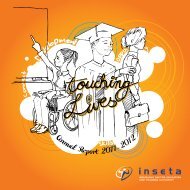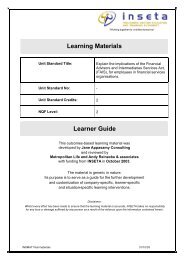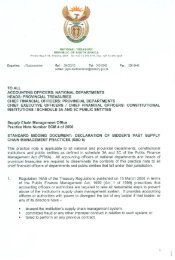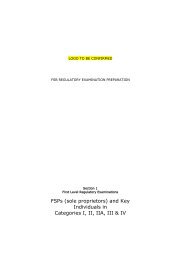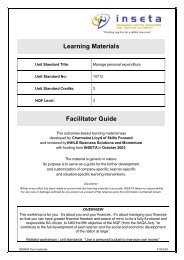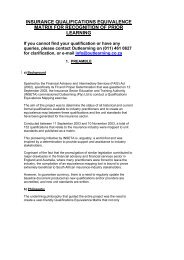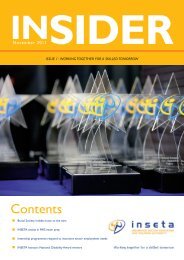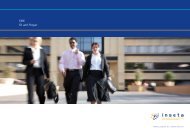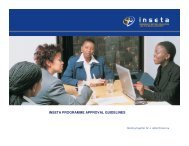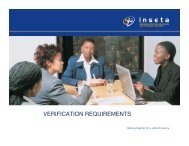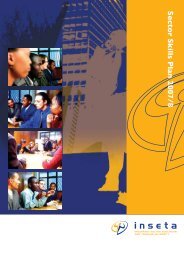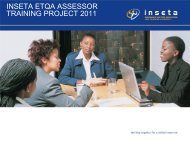CAREER GUIDE MANUAL - Inseta
CAREER GUIDE MANUAL - Inseta
CAREER GUIDE MANUAL - Inseta
Create successful ePaper yourself
Turn your PDF publications into a flip-book with our unique Google optimized e-Paper software.
<strong>CAREER</strong> <strong>GUIDE</strong><strong>MANUAL</strong>
Choosing a careerin Insurance
C O N T E N T S1 ABOUT THE INSURANCE SECTOR 11.1 Overview 11.2 Working conditions 11.3 Employment 21.4 Geographical distribution of workers 22 CHOOSING A <strong>CAREER</strong> 43 <strong>CAREER</strong>S IN INSURANCE 83.1 Professional occupations 81.3.1 Insurance-specific professions 81.3.2 Financial professionals 81.3.3 Legal professionals 81.3.4 Information technology professionals 91.3.5 Health professionals 91.3.6 Client relations and marketing professionals 91.3.7 Human resources professionals 103.2 Clerical and administrative workers 103.3 Sales workers 114 DETAILED DESCRIPTION OF OCCUPATIONS IN INSURANCE 124.1 Financial planner 121.4.1 Nature of work 121.4.2 Personal requirements 121.4.3 Education and training 131.4.4 Licensing requirements 141.4.5 Employment 144.2 Insurance broker or agent 142.4.1 Nature of work 142.4.2 Personal requirements 152.4.3 Education and training 162.4.4 Licensing requirements 172.4.5 Professional bodies 172.4.6 Employment 174.3 Actuary 183.4.1 Nature of work 183.4.2 Personal requirements 183.4.3 Education and training 183.4.4 Employment 20
4.4 Accountant 204.4.1 Nature of work 204.4.2 Personal requirements 204.4.3 Education and training 214.4.4 Employment 254.5 Chartered accountant 265.4.1 Nature of work 265.4.2 Personal requirements 275.4.3 Education and training 275.4.4 Professional registration 295.4.5 Employment 294.6 Underwriter 296.4.1 Nature of work 296.4.2 Personal requirements 306.4.3 Education and training 316.4.4 Employment 324.7 Portfolio manager 327.4.1 Nature of work 327.4.2 Personal requirements 337.4.3 Education and training 337.4.4 Employment 344.8 IT technician/support officer 358.4.1 Nature of work 358.4.2 Personal requirements 358.4.3 Education and training 368.4.4 Workplace and further training 398.4.5 Employment 394.9 Software developer 409.4.1 Nature of work 409.4.2 Personal requirements 419.4.3 Education and training 419.4.4 Employment 444.10 Insurance administrator 4410.4.1 Nature of work 4410.4.2 Personal requirements 4510.4.3 Education and training 4510.4.4 Employment 465 LEARNERSHIPS IN INSURANCE 475.1 What is a learnership? 475.2 What is expected of a learner? 475.3 What is expected of an employer? 485.4 Learnership agreement 48
2positions may work longer hours. Those in marketing and sales positionswork directly with the public and may work irregular hours to fit in with theschedules of their clients.1.3 EMPLOYMENTThe insurance sector in South Africa employs more than 100 000 people mostof whom are employed by the large insurers. The majority of brokerages aresmall organisations that employ 20 or fewer people.Most workers in the sector are employed in clerical and administrativepositions. Service and sales workers, professionals and managers alsoconstitute a sizable portion of the workforce (Figure 1).Percentage employees45403530252015105013.226.91.3 0.040.611.11.2 1.22.60.8 1.1ManagersProfessionalsTechnicians and tradeworkersCommunity and personalservice workersClerical and administrativeworkersSales workersMachinery operators anddriversLabourersUnknownLearners/trainees/studentsContractors/ temporaryworkersFigure 1 Occupational distribution of workers in the insurance sector1.4 GEOGRAPHICAL DISTRIBUTION OF WORKERSMost of the large insurance companies are based in Gauteng and theWestern Cape, and, accordingly, the majority of the job opportunities in
3insurance are in these two provinces.The people working in the otherprovinces are mainly brokers or agents who sell insurance products to thepublic.Western Cape22.8%Eastern Cape4.2%Free State4.4%Northern Cape0.4%North West2.0%Mpumalanga2.7%Limpopo1.5%KwaZulu-Natal9.2%Gauteng52.7%Figure 2 Geographical distribution of workers in the insurance industry
5What am I interested in?What activities do I enjoy most?What kinds of people would I like to work with?What kind of job settings would I enjoy?Values (What are my values?)What would give me satisfaction in a career?In what ways must I be challenged and rewarded in the job I do?In what type of work environments would I be happy?Personality (What kind of a person am I?)What personal qualities do I possess that will help me in the job I choose?How will my personal style influence my career choice?How will I get along with my supervisor and my co-workers?Step 2: Identify options (career knowledge)In the course of gathering information and researching careers, you will needto start identifying your options. Questions you should ask yourself are:At this point, what are my career options?Do I have a strong interest in other types of jobs or careers?What other types of jobs or careers should I be considering?What is career knowledge?Career knowledge entails obtaining knowledge about:Different careersThe type of work in different careersThe salary and benefits in different careersThe type of person who will fit the specific occupationSubjects requiredPersonal characteristics requiredInformation sources that you may useRead career magazines/ books/ career supplements in newspapersAttend career exhibitionsVisit workplacesTalk to employees
6Talk to employersVisit your nearest career information centreContact professional societiesBrowse the InternetStep 3: Evaluate career optionsOnce you have completed your career research, you can evaluateeach of the career options you have identified.Examine the information you already have.Identify what additional resources and information you will need.Seek and use new information.Step 4: Select one of the optionsBased on the information you have gathered and analysed, youshould now be able to choose one of the acreer options.Career choice is a process - it starts when you are very young andcontinues into adulthood.It is an ongoing investment in who you are and how you will fit intothe world of work.How do I make the right choice? (review your previous steps)a) How to make the right choiceMatch your specific characteristics with a specific career.Choose a career path that has different options and opportunities.Ask yourself why you have chosen that particular career.Try to obtain exposure to the career, for example vacation work,voluntary work or an internshipIs there a demand for your chosen career?Make a second choice - we can all be successful in more than onecareer.Do you have enough information to choose one career option overanother? If not, you may need to do more research.
38<strong>CAREER</strong>S IN INSURANCEThe insurance sector provides a wide range of career opportunitiesfor managerial, professional, clerical and administrative and salesstaff. The entry-level occupations in the sector are listed below.The occupations marked with an * are described in more detail inthe next chapter of this career guide.3.1 PROFESSIONAL OCCUPATIONSThese occupations require an NQF Level 5 or higher qualification.1.3.1 Insurance-specific professions Financial and investment advisors* Insurance brokers* Claims assessors* Underwriters* Actuaries* Financial investment managers and fund administrators Portfolio managers* Risk analysts, advisers and consultants1.3.2 Financial professionals Accountants* and chartered accountants* Business analysts and consultants Financial economists and analysts Internal auditors Forensic auditors Management accountants Statisticians Financial market dealers Economists1.3.3 Legal professionals Attorneys, lawyers and legal advisors
91.3.4 Information technology professionals Systems analysts Computer network and systems engineers Software and applications programmers Analyst programmer Systems administrators Database administrators Network administrators ICT support engineers ICT business analysts ICT security specialists Web developers Developer programmers ICT systems test engineers Software engineers ICT trainers Telecommunications engineers Multimedia designers Web designers Multimedia specialists Network analysts1.3.5 Health professionals Nurse practitioners Industrial pharmacists Health diagnostic and promotion professionals Medical practitioners Pharmacist assistants General medical practitioners HIV counsellors Health promotion officers Nurse researchers Dieticians Occupational therapists1.3.6 Client relations and marketing professionals Client relations specialists and consultants Marketing specialists
10Public relations and communications specialistsSales specialists and advisersMarket research analysts1.3.7 Human resources professionals Training and development professionals Human resources advisors Skills development practitioners Recruitment and employment consultants Information and organisation professionals3.2 CLERICAL AND ADMINISTRATIVE WORKERSGeneral clerks and administratorsClient service administratorsInsurance administrators*General secretariesClaims clerksCall centre team leaders and operatorsPersonal assistantsInsurance clerksReceptionistsAccounts clerksFinancial clerksTeam leaders and supervisorsFiling clerksPolicies clerksFinancial supervisorsProgramme and project administratorsAdministration supervisors and team leadersData entry operatorsOffice managersSwitchboard operatorsMailing clerksBookkeepersActuarial clerksHuman resources clerksInsurance investigators
11Word-processing operatorsPayroll clerksCustomer service supervisorsCall centre team leadersLaw clerksLegal secretariesProcurement officersStock clerksWarehouse administratorsLibrary assistantsCoding clerksCouriersDebt collectors3.3 SALES WORKERSInsurance sales consultantsSales representativesSales assistantsTelemarketers
13understand and interpret financial and investment markets; keep abreast of new legislation, tax regimes, government policiesand changes within industries that may affect investment earnings; exercise sound judgement and demonstrate good decision-makingskills; communicate complex financial concepts in simple andunderstandable language; do financial calculations and computer-based analysis; market and sell insurance products.1.4.3 Education and traininga) Entry requirementsMarket entrants who wish to work as financial planners usuallyrequire a Senior Certificate with matriculation exemption and arelevant degree or diploma. Subjects such as mathematics,economics, accounting and English are prerequisites.b) Undergraduate programmesAn undergraduate programme in accounting, finance, economics,business science, mathematics or law provides a sound basis fromwhich to pursue a career in financial planning. In addition to havinga relevant degree or diploma, the candidate should participate incourses and learning programmes in investments, taxes, estateplanning and risk management. The table below lists some relevantundergraduate courses. Readers should also consult the coursesrelevant to the career of accountant as listed in this career guide.QUALIFICATIONINSTITUTIONPostgraduate Diploma in Financial Planning University of the Free StateAdvanced Diploma in Financial PlanningUniversity of the Free StatePostgraduate Diploma in Financial Planning Stellenbosch UniversityBCom Investment ManagementUniversity of PretoriaBCom Finance ManagementUniversity of JohannesburgBCom Financial PlanningNelson Mandela Metropolitan UniversityBCom Financial PlanningUniversity of KwaZulu-NatalBCom BankingDamelinDiploma in Insurance (DiI) (Advanced InsurancePractice)College of Insurance of IISASource: www.ifp.co.za; www.inseta.co.za; www.sainsurance.co.za
14c) Professional qualificationsFinancial planning practitioners who have successfully completed thePostgraduate Diploma in Financial Planning at the University of theFree State or the University of Stellenbosch may apply to the FinancialPlanning Institute of Southern Africa (FPI) to be registered as certifiedfinancial planners (CFPs). The CFP is an international credentialissued by the Certified Financial Planner Board of Standards in theUSA (and its authorised licensees around the world) and is the highestprofessional designation awarded to a financial planner. Candidatesare admitted only if the FPI declares them to be “fit and proper“persons who participate in continuous professional education andupon payment of membership fees. The FPI also awards thequalification of associate financial planner (AFP) to graduates whohave achieved qualifications in financial advice and planning andhave two years relevant industry experience.1.4.4 Licensing requirementsFinancial advisors are required to apply for registration as financial servicesproviders with the Financial Services Board (FSB). Licensing requirements areset in terms of the Financial Advisory and Intermediary Services (FAIS) Act,37 of 2000, and include criteria for personal character (integrity andhonesty), education and training, competence and operational ability.1.4.5 EmploymentAlthough financial planners are employed by insurance companies, brokerfirms, banks and financial investment houses, many are self-employed andoperate small investment advisory businesses.4.2 INSURANCE BROKER OR AGENT 32.4.1 Nature of workAn insurance broker or insurance sales agent sells insurance policies andproducts to individuals, families and businesses to safeguard them againstfuture losses and possible financial risks arising from death, injury, accidents,3The information relating to the career of an insurance broker or agent was sourced from www.careers.co.za;www.kiwicareers.gov.nz; www.bls.gov; www.saia.co.za; www.fsb.co.za; www.ibcsa.org.za
15natural disasters, fire and theft. Insurance brokers have to analyse the needsof their clients and assist them to acquire the protection that best meets theidentified needs. Insurance protection covers houses and property, vehicles,personal accident and trauma, disability, income protection, personal andfamily health to cover hospital and medical costs, life cover for breadwinners,product liability and professional indemnity.Insurance brokers or agents who are employed by one insurance companyare called “tied agents“ because they promote only the products of the onecompany. Independent brokers market the products of several companiesand place insurance policies for their clients with the company that offers thebest rates, coverage and benefits. Brokers also provide clients withinformation on investment instruments such as mutual funds, annuities andlong-term savings plans.Insurance brokers use their marketing, organisational and public relationsskills to meet with people who require insurance, secure quotations onproducts, advise clients on risks and benefits, sell policies, help clients tocomplete application forms and submit relevant information, answer queriesand assist with the submission of insurance claims against the particularpolicies. The work of an insurance broker often overlaps with that of afinancial advisor. Insurance companies are increasingly placing insuranceagents in call centres to market their products and services.2.4.2 Personal requirementsInsurance brokers should havegood people skills to interview and listen to clients and identify theirinsurance needs;patience to offer help and respond to queries;the ability to gain the trust of other persons;the ability to do calculations and compare rates and product benefits;the ability to plan and organisecomputer skills.
17QUALIFICATIONBCom Risk Management (UNISA)BSc Financial MathematicsDiploma in Insurance (DiI)(Advanced Insurance Practice)Higher Certificate in Insurance (HCiI)(Life Insurance Servicing)Higher Certificate in Insurance (HCiI) (Life Insurance)Higher Certificate in Insurance (HCiI)(Retirement Fund Management)Higher Certificate in Insurance (HCiI) (Short Term)NDip Financial Markets and InstrumentsSource: www.careers.co.za; www.saia.co.za.INSTITUTIONMidrand Graduate InstituteUniversity of JohannesburgCollege of Insurance of IISACollege of Insurance of IISACollege of Insurance of IISACollege of Insurance of IISACollege of Insurance of IISAAcademy of Financial Markets2.4.4 Licensing requirementsInsurance brokers or agents who render financial services on financialproducts are required to apply for registration as financial services providerswith the Financial Services Board (FSB). Licensing requirements are set interms of the Financial Advisory and Intermediary Services (FAIS) Act, 37 of2000, and include criteria for personal character (integrity and honesty),education and training, competence and operational ability.2.4.5 Professional bodiesIndependent insurance brokers who adhere to a code of ethics and practiceas financial advisors in the areas of long-term insurance, short-term insurance,collective investment schemes, medical or health benefits oremployee/pension fund benefits may apply for membership of the InsuranceBrokers Council of South Africa, a professional body that promotes theinterests of its members and their training.2.4.6 EmploymentAlthough insurance companies employ large numbers of brokers, manybrokers are self-employed or work in the broader financial services sector inbanks and firms that provide financial advisory services to individuals andcompanies.
203.4.4 EmploymentAlthough insurance companies employ a substantial proportion of actuaries,many actuaries are self-employed or work for specialised actuarial firms thatprovide consultancy services to the insurance industry as well as to otherclients.4.4 ACCOUNTANT 54.4.1 Nature of workAccountants use their numerical, analytical, statistical and management skillsto maintain reliable accounting and financial systems and to advisebusinesses on a variety of financial matters.An accountant analyses and evaluates the financial information of a businessand communicates the findings to management so that management canmake informed business decisions. Typically, accountants are required toprepare company budgets and financial statements, monitor cash flow andoperational costs, and oversee financial investments, risk management anddebt collection. Accountants also ensure that companies comply with industryand legal requirements in financial reporting. Accountants often specialise ina particular field of accountancy such as pure accounting, financialaccounting, taxation, internal auditing, and cost and managementaccounting.Accountants in the insurance industry report on premium income, claimsexpenditure paid, taxation and company expenditure so that managementmay keep track of the company's financial position. Accountants with higherlevel qualifications are often members of the senior management team whileother accountants oversee the work of accounting technicians and accountingofficers.4.4.2 Personal requirementsAccountants shouldhave integrity and be trustworthy;be proficient in mathematics;5Information relating to this career was sourced from www.careers.co.za; www.kiwicareers.gov.nz;www.cfa-sa.co.za; www.acca.org.za; www.fasset.org.za.
21be able to work accurately and undertake detailed work;have strong analytical skills to consider and compare facts andfigures quickly;be able to use computer software to perform a variety of tasks andfunctions;be able to communicate effectively verbally and in writing;have sound judgement and good decision-making skills;be able to work well in a team.4.4.3 Education and traininga) Entry requirementsA Senior Certificate with matriculation exemption is required to enteran undergraduate programme. Mathematics and English arecompulsory subjects while accounting, economics and businesseconomics at Grade 12 level are recommended subjects.b) Undergraduate training programmesThe training of an accountant starts with an undergraduate course inaccounting. The following relevant courses are offered by SouthAfrican universities, universities of technology and private institutions.QUALIFICATIONBAccountingBAccountingBAccountingBAccountingBAccountingBAccountingBAccounting ScienceBAccounting, LLBBBusiness and Commerce AccountingBBusiness Science Extended ProgrammeBBusiness Science Management StudiesBCom (UNISA)BCom AccountingBCom AccountingBCom AccountingBCom AccountingBCom AccountingBCom AccountingBCom AccountingINSTITUTIONRhodes UniversityStellenbosch UniversityUniversity of Fort HareUniversity of KwaZulu-NatalUniversity of the WitwatersrandWalter Sisulu UniversityUniversity of South Africa (UNISA)Stellenbosch UniversityMonash South AfricaUniversity of Cape TownUniversity of Cape TownBoston City Campus and BusinessCollegeDamelin Education GroupMidrand Graduate InstituteNorth-West UniversityRhodes UniversityUniversity of Fort HareUniversity of JohannesburgUniversity of KwaZulu-Natal
22QUALIFICATIONBCom AccountingBCom AccountingBCom AccountingBCom AccountingBCom AccountingBCom Accounting and InformaticsBCom Accounting SciencesBCom Chartered AccountingBCom Cost and Management AccountingBCom Financial AccountingBCom Financial AccountingBCom Financial ManagementBCom Financial Management SciencesBCom GeneralBCom GeneralBCom GeneralBCom GeneralBCom GeneralBCom GeneralBCom GeneralBCom GeneralBCom General AccountingBCom General AccountingBCom Management AccountancyBCom Management AccountingBCom Management AccountingBCom Management AccountingBCom Management AccountingBCom Management AccountingBCom Management Accounting (UNISA)BCom Municipal AccountingBCom RationumBComptBComptBComptBCompt (UNISA)BCompt (UNISA)BCompt AccountingBCompt Accounting Science (UNISA)BCompt AuditingBCompt Chartered Accounting (UNISA)BCompt Management AccountingBPub AccountingBTech Cost and Management AccountingINSTITUTIONUniversity of LimpopoUniversity of the Free StateUniversity of the Western CapeUniversity of VendaUniversity of ZululandNorth-West UniversityUniversity of PretoriaNelson Mandela MetropolitanUniversityUniversity of VendaNorth-West UniversityStellenbosch UniversityUniversity of JohannesburgUniversity of PretoriaNelson Mandela MetropolitanUniversityNorth-West UniversityRhodes UniversityStellenbosch UniversityUniversity of Fort HareUniversity of KwaZulu-NatalUniversity of South Africa (UNISA)University of the Western CapeNelson Mandela MetropolitanUniversityUniversity of Cape TownNorth-West UniversityDamelin Education GroupStellenbosch UniversityUniversity of LimpopoUniversity of South Africa (UNISA)University of the Free StateMidrand Graduate InstituteUniversity of South Africa (UNISA)Nelson Mandela MetropolitanUniversityDamelin Education GroupUniversity of South Africa (UNISA)Walter Sisulu UniversityBoston City Campus and BusinessCollegeDurbanville CollegeUniversity of LimpopoVarsity CollegeUniversity of LimpopoICESA City CampusUniversity of LimpopoUniversity of the Free StateDurban Institute of Technology
23QUALIFICATIONINSTITUTIONBTech Cost and Management AccountingUniversity of South Africa (UNISA)BTech Cost and Management AccountingWalter Sisulu UniversityBTech Finance and Accounting (Public)Tshwane University of TechnologyBTech Financial Information SystemsCape Peninsula University ofTechnologyBTech Financial Information SystemsCentral University of TechnologyBTech Financial Information SystemsDurban Institute of TechnologyBTech Financial Information SystemsTshwane University of TechnologyBTech Financial Information TechnologyNelson Mandela MetropolitanUniversityBTech Local Government FinanceTshwane University of TechnologyBTech Local Government FinanceUniversity of South Africa (UNISA)BTech TaxationCape Peninsula University ofTechnologyBTech TaxationDurban Institute of TechnologyBTech TaxationUniversity of South Africa (UNISA)Certificate in AccountancySouthern Business SchoolCertificate in Accounting and EndUser Computing Financial ServicesCertificate in Certified Accounting Technician Boston City Campus and BusinessCollegeCertificate in Cost and Management Accounting (IAC) Damelin CorrespondenceCertificate in Financial PlanningDamelin Education GroupCertificate in Local Government FinanceDamelin CorrespondenceDiploma in AccountancySouthern Business SchoolDiploma in Accounting and Business Administration ICESA City CampusDiploma in Accounting and Financial Computing Rosebank CollegeDiploma in Accounting and TaxationMidrand Graduate InstituteDiploma in Chartered Institute of Secretaries andAdministrators (CIS) Administration, Business andOffice WorkDurban Institute of TechnologyDiploma in Financial Accounting (IAC)Damelin CorrespondenceHigher Certificate in Cost and ManagementAccounting (IAC)Damelin CorrespondenceNCert AccountingUniversity of South Africa (UNISA)NCert Financial Information SystemsUniversity of South Africa (UNISA)NCert: N4-N6 Cost and Management Accounting Northern Cape Urban FET CollegeNDip AccountingCape Peninsula University ofTechnologyNDip AccountingDurban Institute of TechnologyNDip AccountingMangosuthu TechnikonNDip AccountingTshwane University of TechnologyNDip AccountingUniversity of South Africa (UNISA)NDip AccountingWalter Sisulu UniversityNDip Cost and Management AccountingCentral University of TechnologyNDip Cost and Management AccountingDurban Institute of TechnologyNDip Cost and Management AccountingMangosuthu TechnikonNDip Cost and Management AccountingUniversity of South Africa (UNISA)NDip Cost and Management AccountingVaal University of Technology
24QUALIFICATIONNDip Cost and Management AccountingNDip Cost and Management AccountingNDip Cost and Management Accounting(Cape Peninsula University of Technology)NDip Cost and Management Accounting (UNISA)NDip Credit ManagementNDip Finance and Accounting (Public)NDip Financial and Accounting: PublicNDip Financial Information SystemsNDip Financial Information SystemsNDip Financial Information SystemsNDip Financial Information SystemsNDip Financial Information SystemsNDip Financial Information SystemsNDip Financial Information SystemsNDip Financial Information SystemsNDip Local Government FinanceNDip Local Government FinanceNDip TaxationNDip TaxationNHCert AccountancyNHCert Accountancy (Accounting Option)NHCert Accountancy (Cost and ManagementAccounting Option)NHCert Accountancy (Taxation Option)NHCert AccountingNHCert AccountingNHCert AccountingNHCert AccountingNHCert AccountingNHCert Financial Information SystemsNHCert Financial Information SystemsINSTITUTIONWalter Sisulu UniversityWalter Sisulu UniversitySouth Cape FET CollegeNorthlink FET CollegeTshwane University of TechnologyMangosuthu TechnikonUniversity of South Africa (UNISA)Cape Peninsula University ofTechnologyDurban Institute of TechnologyNelson Mandela MetropolitanUniversityUniversity of JohannesburgUniversity of South Africa (UNISA)Vaal University of TechnologyWalter Sisulu UniversityWalter Sisulu UniversityUniversity of South Africa (UNISA)Walter Sisulu UniversityDurban Institute of TechnologyUniversity of South Africa (UNISA)Walter Sisulu UniversityDurban Institute of TechnologyDurban Institute of TechnologyDurban Institute of TechnologyCentral University of TechnologyNelson Mandela MetropolitanUniversityUniversity of JohannesburgUniversity of South Africa (UNISA)Vaal University of TechnologyUniversity of South Africa (UNISA)Walter Sisulu Universityc) Professional qualificationsSeveral professional bodies offer accounting graduates and traineesadditional postgraduate and workplace-based qualifications. Thetable below summarises the qualifications and membership offered tohigh-end accounting professionals.
264.5 CHARTERED ACCOUNTANT 65.4.1 Nature of workA chartered accountant (CA) is a highly qualified professional who appliesaccounting, mathematical and analytical skills to solve business, taxation,financial and management problems. Chartered accountants who work incommerce and industry are involved in all critical business areas such asaccounting, strategic business planning, marketing, information technologyand financial management. Typically, chartered accountants in the insuranceindustry are required to do the following: Prepare the financial statements of a company. Record, monitor and interpret financial results. Develop and maintain reporting, cost accounting and computersystems. Improve internal and operational controls. Oversee day-to-day financial management such as budgeting, cashflow forecasting, business planning and longer term corporatefinance planning. Promote optimal financial effectiveness and efficiency within theorganisation. Act as a financial executive or director and as a key player in the topmanagement team. Manage and minimise the company's tax liabilities. Manage the company's asset base, including asset sales andacquisitions.Legislation requires all companies to prepare annual audited financialstatements. Many chartered accountants in public practice specialise asauditors who review businesses' financial status and operations. As auditors,they provide assurance as to whether or not the annual financial statementsfairly represent the results and financial position of a company. Charteredaccountants in public practice may be self-employed or work in a firm thatrenders specialised financial services including auditing services, taxplanning and advice, management consultancy to improve clients'profitability and forensic accounting to investigate and uncover fraudulentaccounting practices. Prior to company mergers and acquisitions, charteredaccountants conduct due diligence investigations to determine the value and6 The information relating to the career of a chartered accountant was sourced from www.saica.co.za; www.paab.co.za;www.careers.co.za; www.kiwicareers.gov.nz.
27viability of the business to be acquired. When a company faces insolvency,chartered accountants assess the chances of recovery and advise on whetherthe company should be sold as a going concern, placed under judicialmanagement to continue operations, restructured in order to survive orliquidated to pay creditors.5.4.2 Personal requirementsChartered accountants shouldpossess integrity, self-discipline and resolve;be proficient in mathematics and English;be conscientious and diligent;have strong analytical capabilities to compare and interpret facts andfigures quickly and accurately;have sound judgement and good decision-making skills;be able to communicate clearly in speech and writing;be able to work accurately and in detail;be able to work well with other people in a team.5.4.3 Education and trainingChartered accountants have to undergo rigorous training. The minimum studyperiod to qualify as a chartered accountant is seven years. The South AfricanInstitute of Chartered Accountants (SAICA) sets, monitors and maintainsqualification and practice standards for the profession. To enter theprofession, students have to complete a three-year undergraduate course inaccounting, obtain a postgraduate Certificate in the Theory of Accounting(CTA) or an equivalent BCom Honours Degree in Accounting, complete threeyears on a workplace-based learnership or training contract with anaccredited provider and pass Parts 1 and 2 of the Qualifying Examinations.a) Entry requirementsThe entry requirements for undergraduate programmes in accountingare set by each of the different universities. As a rule, aspirantstudents require a Senior Certificate with matriculation exemption andEnglish and mathematics, preferably at the higher grade. Accountingat Grade 12 level is recommended.
28b) Undergraduate and postgraduate programmesStudents have to complete a recognised undergraduate accountingdegree to gain entry into an accredited CTA programme. Thefollowing are recognised undergraduate and accreditedpostgraduate CTA qualifications offered by South African Universities.SAICA-RECOGNISEDUNDERGRADUATEQUALIFICATIONBCom (Chartered Accountancy)SAICA-ACCREDITEDPOSTGRADUATEQUALIFICATIONBCom Hons (CharteredAccountancy)INSTITUTIONNorth-West UniversityBCom (Acc) BCom (Acc) Hons University of JohannesburgBCom (Acc)BAccBCom AccountingBBus SciPostgraduate Diploma inAccountancy (PGDA)Postgraduate Diploma inAccounting (PGDA)Rhodes UniversityUniversity of Cape TownBCom (Acc) BCom Hons (Acc) University of KwaZulu-NatalBCom (Acc)BCom Hons (Acc)Nelson Mandela MetropolitanUniversityBCom BCom Hons University of PretoriaBComptBAccBAccBCom (Accounting)BCom (Management Accounting)BCom (Acc)BAccBCom (Acc)BComptSource: www.saica.co.zaHons BComptBAcc HonsPostgraduate Diploma inAccounting (PGDA)BAcc HonsBCom Hons (Accounting)BCom Hons (Acc) PostgraduateDiploma in Accounting (PGDA)BCom Hons (Acc)HDipAccUniversity of South Africa(UNISA)Stellenbosch UniversityUniversity of the Free StateUniversity of the Western CapeUniversity of the WitwatersrandUniversity of Fort HareUniversity of Limpopoc) Professional qualificationsThe CTA or Honours degree in Accounting is a prerequisite forcandidates who intend to write the qualifying examinations forchartered accountants. Before entering into a three-year trainingcontract, students choose whether to specialise in auditing or financial
29Part 1 of the Professional Examination assessesmanagement.candidates' aptitude for and knowledge of management accounting,financial accounting, auditing, business information systems, taxationand estates while Part 2 tests either auditing or financial managementskills. SAICA confers the designation of Chartered Accountant(CA(SA)) to persons who successfully pass the qualifyingexaminations. Continuous registration with SAICA is a prerequisitefor retention of the designation.5.4.4 Professional registrationChartered accountants who enter public practice are required to register withthe Independent Registration Board for Auditors (IRBA), the statutory regulatorfor the public audit function.5.4.5 EmploymentAs highly trained professionals, chartered accountants are in great demand.Employment opportunities in the labour market usually exceed the supply ofchartered accountants, and chartered accountants consequently enjoyexcellent employment prospects. Although chartered accountants are widelyemployed in the insurance industry, many work in specialised auditing,accounting and financial services firms that offer consultancy services, whileothers are self-employed or work in senior and top management positionsacross all economic sectors.4.6 UNDERWRITER 76.4.1 Nature of workAn insurance underwriter identifies and calculates the risk of loss underinsurance policies and enables an insurance company to charge anappropriate premium to cover those risks. Since insurance companies are inbusiness to make profits, underwriters use their analytical, statistical, technicaland insurance industry knowledge to assess the likelihood of claims beingmade by policyholders and prospective clients. Once the risks aredetermined, underwriters help insurance companies to set appropriatepremium rates, write policies that cover the risks or exclude parts of the risks7The information relating to the career of an underwriter was sourced from www.bls.gov; www.kiwicareers.gov.nz;www.prospects.ac.uk; www.collegegrad.com.
337.4.2 Personal requirementsAlthough portfolio managers have their own personal way of investing, theyall need strong quantitative analytical skills. They should also be openminded,well-disciplined, patient and have a thorough understanding ofcompanies and financial markets so that they can detect changes in themarket quickly and react acccordingly.Portfolio managers need good communication skills to build relationships withtheir clients and understand their financial needs. They must be able to doformal presentations that persuasively demonstrate their investment strategiesto people who are not necessarily financial experts. Clients want regularfeedback on the performance of their investments through performancereports. These reports should be user-friendly documents that indicate whatthe actual performance was, how the performance was achieved, forexample stock selection and asset allocation, and how good or bad theperformance was compared to the investments made by other portfoliomanagers and other financial products.Volatile markets can make the life of portfolio managers very stressful. To besuccessful, they therefore need the ability to remain calm and work efficientlyunder pressure.7.4.3 Education and training(a)(b)Entry requirementsBecause a tertiary qualification is required, the candidate must havea Senior Certificate with matriculation exemption. Compulsorysubjects are mathematics and English; useful subjects are accounting,computer science and economics.Undergraduate programmesA Bachelor's degree in finance or economics is a minimumrequirement for portfolio managers, most of whom have an MBA witha financial or economic focus. Many portfolio managers arechartered accountants who have passed the exams and requirementsof the South African Institute of Chartered Accountants (SAICA).
34A portfolio manager needs to have studied and gained expertise in suchareas as bond valuations, capital markets and interest rates, financialstatement analysis, portfolio theory and management, fixed incomeinvestment, international economics and trade, equity strategies andcomputer research.The table below lists some appropriate undergraduate courses. Readersshould also consult the courses relevant to the career of the financial planneras listed in this career guide.QualificationBachelor of Arts: EconomicsBachelor of Business Science: EconomicsBachelor of Commerce: EconomicsBachelor of Commerce: EconomicsBachelor of Commerce: EconomicsBachelor of Commerce: EconomicsBachelor of Commerce: EconomicsBachelor of Commerce: EconomicsBachelor of EconomicsBachelor of EconomicsBachelor of EconomicsAdvanced Diploma: Management: FinanceBachelor of Business Science: FinanceBachelor of Commerce: Economics and FinanceBachelor of Commerce: FinanceBachelor of Commerce: FinanceSource: www.saqa.org.zaInstitutionUniversity of the Free StateUniversity of KwaZulu-NatalUniversity of LimpopoUniversity of VendaUniversity of the Free StateUniversity of JohannesburgUniversity of Western CapeUniversity of PretoriaUniversity of VendaUniversity of the Free StateRhodes UniversityUniversity of Western CapeUniversity of KwaZulu-NatalUniversity of Cape TownUniversity of JohannesburgUniversity of Western Cape7.4.4 EmploymentMany portfolio managers start out as members of a team of research analysts,analyzing certain segments of a given industry such as the retail or miningindustry. The analysts research individual companies and write industryreports for portfolio managers to read and consider.After gaining the necessary experience, analysts can move on to writingresearch reports on individual companies that the portfolio manager may usein deciding whether or not to buy a company's stock or bonds. Analysts willlater be in a position to work as members of a portfolio management team.Good places to start are bank trust departments, insurance companies andpension funds. Many people cross over into portfolio management after yearsof experience in the sales side of investment banking.
354.8 IT TECHNICIAN / SUPPORT OFFICER 98.4.1 Nature of workBecause computer systems are crucial for most business activities such as theprocessing of financial transactions, sales and production, orders, anddispatches and record keeping, systems downtime must be avoided orminimised. IT technicians are tasked with ensuring the smooth running ofcomputer systems and the ongoing functionality of individual workstations.These technical support officers are required to assemble, install, maintainand repair computer hardware, software and network equipment.IT technicians are often responsible for specific areas of the computer andbusiness systems such as file servers, printers and scanners, and local areanetworks. They work behind the scenes to ensure that business systems runsmoothly, and they assist front-end users with problems at workstations. ITtechnicians diagnose and repair hardware faults and replace dysfunctionalparts. They are also called upon to solve the numerous problems experiencedby computer users. IT support officers liaise with their clients by phone, e-mailor on site and endeavour to deliver functional and reliable computers andsystems in the shortest possible time. They spend many hours with computerusers and are required to explain solutions repeatedly.IT technicians may also be required to keep records of software andequipment and to run test programmes.8.4.2 Personal requirementsIT technicians should haveextensive knowledge of computer systems, including hardwarecomponents, networks, operating platforms and software used bybusinesses;good listening and communication skills to work with their clients;patience and persistence;talent for analysing and solving problems;logical and practical thinking skills;good hand-eye co-ordination to service and repair computercomponents;9The information relating to the career of an IT technician / support officer was sourced from www.careers.co.za;www.kiwicareers.gov.nz; www.prospects.ac.uk; www.collegegrad.com.
37QUALIFICATIONSINSTITUTIONBComm Information SystemsUniversity of Fort HareBSc Computer ScienceStellenbosch UniversityBSc Computer ScienceUniversity of KwaZulu-NatalBSc Computer ScienceUniversity of ZululandBSc Computer Science (UNISA)Midrand Graduate InstituteBSc Computer Science and Computer Engineering North-West UniversityBSc Computer Science and Information Systems Nelson Mandela Metropolitan UniversityBSc Computer Science and Information Technology University of KwaZulu-NatalBSc Computer Science and Information Technology Walter Sisulu UniversityBSc Computer SciencesUniversity of the Western CapeBSc GeneralUniversity of LimpopoBSc Informatics and Decision Modelling (UNISA) Midrand Graduate InstituteBSc Information SystemsRhodes UniversityBSc Information SystemsUniversity of ZululandBSc Information TechnologyNelson Mandela Metropolitan UniversityBSc Information TechnologyNorth-West UniversityBSc Information TechnologyUniversity of Cape TownBSc Information TechnologyUniversity of JohannesburgBSc Information TechnologyUniversity of KwaZulu-NatalBSc Information Technology (5 fields of study) University of the Free StateBSc Information Technology (5 fields of study) University of the Free StateBSc Information Technology and Computer Science University of South Africa (UNISA)BSc Information Technology and Management(UNISA)Midrand Graduate InstituteBSc Information Technology ManagementUniversity of South Africa (UNISA)BSc Mathematical SciencesUniversity of the WitwatersrandBSocSc Information SystemsRhodes UniversityBSocSc Information TechnologyUniversity of KwaZulu-NatalBTech Computer SystemsTshwane University of TechnologyBTech Computer Systems EngineeringCape Peninsula University of TechnologyBTech Computer Systems EngineeringUniversity of JohannesburgBTech Computer Systems EngineeringVaal University of TechnologyBTech Information TechnologyCape Peninsula University of TechnologyBTech Information TechnologyDurban Institute of TechnologyBTech Information TechnologyNelson Mandela Metropolitan UniversityBTech Information TechnologyUniversity of JohannesburgBTech Information TechnologyUniversity of South Africa (UNISA)BTech Information TechnologyVaal University of TechnologyBTech Information TechnologyWalter Sisulu UniversityBTech Information Technology (SoftwareDevelopment)Tshwane University of TechnologyBTech Information Technology (Software Technology) Central University of TechnologyCertificate in Computer Graphics (LearningProgramme)Oval InternationalCertificate in Computers and Accounting (LearningProgramme)Oval InternationalCertificate in Computers and Administration(Learning Programme)Oval International
38QUALIFICATIONSINSTITUTIONCertificate in Executive Secretarial and ComputerStudiesICESA City CampusCertificate in Information TechnologyBuffalo City Public FET CollegeCertificate in Information TechnologyICESA City CampusCertificate in Introduction to C++ Programming Damelin CorrespondenceCertificate in Introduction to JavaDamelin CorrespondenceCertificate in Introduction to Visual Basic.net Damelin CorrespondenceCertificate in Introduction to Visual C#Damelin CorrespondenceCertificate in Introduction to Visual C#Damelin CorrespondenceCertificate in Introduction to Visual C++.net Damelin CorrespondenceCertificate in PC EngineeringCollege CampusCertificate in Programming PrinciplesDamelin Education GroupComputer Studies (ICDL)Capricorn FET CollegeDiploma in Business Information Technology Rosebank CollegeDiploma in Computer ProgrammingCenturion AcademyDiploma in Computer Programming (C++Elective) Damelin CorrespondenceDiploma in Computer Programming andInformation SystemsDurbanville CollegeDiploma in Information TechnologyBoland FET CollegeDiploma in Information TechnologyICESA City CampusDiploma in Information Technology (ApplicationDevelopment and Networking)(NQF Level 6) Oval InternationalDiploma in Information Technology (InternetDevelopment)(NQF Level 6)Oval InternationalDiploma in Information Technology (NQF Level 5) PC Training and Business CollegeDiploma in Information Technology (Programming) College CampusDiploma in Information Technology (Programming) Varsity CollegeDiploma in Information Technology Programming Rosebank CollegeDiploma in Network EngineeringCenturion AcademyExternal Certificate in Advanced Java Programming Damelin CorrespondenceExternal Certificate in Network +Damelin CorrespondenceExternal Certificate in Programming inVisual Basic 6.0Damelin CorrespondenceExternal Certificate in Security +Damelin CorrespondenceHigher Certificate in C++ ProgrammingDamelin CorrespondenceInternational Certificate in Computer Science(ICCS)Northlink FET CollegeNCert Computor ScienceTshwane University of TechnologyNCert DatametricsUniversity of South Africa (UNISA)NCert Information TechnologyCape Peninsula University of TechnologyNCert Information TechnologyCentral University of TechnologyNCert Information TechnologyUniversity of South Africa (UNISA)NCert Information Technology (Technical Support) PC Training and Business CollegeNCert: N1- N2 Information TechnologyNkangala FET CollegeNCert: N1- N3 Computer TechnologyWestcol FET CollegeNCert: N3 - N6 Computer PracticeSouth Cape FET CollegeNCert: N4 - N6 Computer PracticeNkangala FET CollegeNCert: N4 - N6 Computer PracticeNorthern Cape FET CollegeNCert: N4 - N6 Information ProcessingKing Sabata Dalindyebo FET College
39QUALIFICATIONSNCert: N4 -N6 Information TechnologyNCert: N4 -N6 Computer TechnologyNCOR Computer TechnologyNDip Computer SystemsNDip Computer Systems EngineeringNDip Computer Systems EngineeringNDip Computer Systems EngineeringNDip Computer Systems EngineeringNDip Computor Systems EngineeringNDip Information TechnologyNDip Information TechnologyNDip Information TechnologyNDip Information TechnologyNDip Information TechnologyNDip Information TechnologyNDip Information TechnologyNDip Information TechnologyNDip Information Technology (SoftwareDevelopment)NDip Information Technology (SoftwareDevelopment)NDip Information Technology (Web and ApplicationDevelopment) (UNISA)NHCert Computer StudiesNHCert Computer StudiesNHCert Information TechnologyNHDip Information Technology (UNISA)Source: www.careers.co.zaINSTITUTIONCoastal FETWestcol FET CollegeWestcol FET CollegeNelson Mandela Metropolitan UniversityCentral University of TechnologyDurban Institute of TechnologyUniversity of JohannesburgVaal University of TechnologyCape Peninsula University of TechnologyCape Peninsula University of TechnologyDurban Institute of TechnologyMangosuthu TechnikonUniversity of JohannesburgUniversity of South Africa (UNISA)Vaal University of TechnologyWalter Sisulu UniversityWalter Sisulu UniversityCentral University of TechnologyNelson Mandela Metropolitan UniversityNorthlink FET CollegeTshwane University of TechnologyTshwane University of TechnologyUniversity of South Africa (UNISA)College Campus8.4.4 Workplace and further trainingFurther training takes place in the workplace by learning from moreexperienced technical support officers and through problem solving. ITtechnicians are also required to learn through self-study - reading manuals,studying computer system diagrams and using help screens.Because it is critical to keep up to date with changes in hardware, softwareand new technologies, many employers offer in-house training andencourage IT technicians to attend external courses.8.4.5 EmploymentSince technology, electronic workflow and computerised business systems arewidely used in insurance and financial services industries, suitably qualified
40IT technicians may explore many employment opportunities with insurancecompanies and with brokerages and private firms that offer technicalcomputer support to employers within those industries.4.9 SOFTWARE DEVELOPER 109.4.1 Nature of workA software developer analyses the problems and needs of computer usersand businesses and writes computer programmes to enhance the applicationand efficiency of computer systems.Software developers design, test and maintain systems software that runs theoperating systems of computers; they also work on the application softwareused by the end-users to prepare documents, reports and spreadsheets. Alsoknown as software engineers, software developers use a variety of computerprogramming languages and applications to perform their tasks. They consultwith management and computer users to collect information on businessneeds and work in teams with other IT professionals to evaluate theinformation and to design, write and test new software programmes or tomodify existing systems.With the introduction of new computer systems and the expansion of their use,software programmers have to ensure that different systems can shareinformation and communicate with one another. Codes are therefore devisedto link incompatible platforms, and interfaces are developed to integratemultiple existing software products. Software developers should accordinglybe able to work with several programming languages and a variety ofsoftware packages.Among their other typical duties are to write and maintain the operationaldocumentation of the business systems and to assess new informationtechnologies. Because information and communication technologies developso rapidly, software developers are required to be life-long learners to stayabreast of dynamic changes across the IT world.As the insurance industry expands its need to store, share and retrieve datawithin businesses and to establish electronic and internet links with10The information relating to the career of a software developer was sourced from www.bls.gov; www.kiwicareers.gov.nz;www.careers.co.za; www.prospects.ac.uk; www.collegegrad.com.
42Software engineering or computer scienceInformation science, informatics or management information systemsElectrical or electronic engineeringPhysicsMathematicsThe following are relevant undergraduate and tertiary-level courses forlearners who intend to become software developers.QUALIFICATIONB.IT Information TechnologyBBusiness Science Computer ScienceBBusiness Science Information SystemsBBusiness SystemsBCom Accounting and InformaticsBCom Business Information SystemsBCom Computer Science and Information SystemsBCom Economics and InformaticsBCom InformaticsBCom InformaticsBCom InformaticsBCom Informatics (UNISA)BCom Informatics (UNISA)BCom Informatics with IT ManagementBCom Information SystemsBCom Information TechnologyBCom Information TechnologyBComm Information SystemsBComputingBSc Computer ScienceBSc Computer ScienceBSc Computer ScienceBSc Computer Science (UNISA)BSc Computer Science and Computer EngineeringBSc Computer Science and Information SystemsBSc Computer Science and Information TechnologyBSc Computer Science and Information TechnologyBSc Computer, Economic and Mathematical SciencesBSc Industrial Mathematics and InformaticsBSc InformaticsBSc Information SystemsBSc Information SystemsBSc Information TechnologyBSc Information TechnologyINSTITUTIONUniversity of PretoriaRhodes UniversityRhodes UniversityMonash South AfricaNorth-West UniversityUniversity of VendaNelson Mandela MetropolitanUniversityNorth-West UniversityDamelin Education GroupUniversity of South Africa (UNISA)University of PretoriaICESA City CampusMidrand Graduate InstituteUniversity of JohannesburgUniversity of Cape TownUniversity of the Free StateUniversity of ZululandUniversity of Fort HareMonash South AfricaUniversity of KwaZulu-NatalStellenbosch UniversityUniversity of ZululandMidrand Graduate InstituteNorth-West UniversityNelson Mandela MetropolitanUniversityUniversity of KwaZulu-NatalWalter Sisulu UniversityNorth-West UniversityNorth-West UniversityMidrand Graduate InstituteRhodes UniversityUniversity of ZululandNelson Mandela MetropolitanUniversityNorth-West University
43QUALIFICATIONINSTITUTIONBSc Information TechnologyUniversity of Cape TownBSc Information TechnologyUniversity of JohannesburgBSc Information TechnologyUniversity of KwaZulu-NatalBSc Information TechnologyUniversity of the Free StateBSc Information Technology and Computer Science University of South Africa (UNISA)BSc Information Technology and Management (UNISA) Midrand Graduate InstituteBSc Information Technology ManagementUniversity of South Africa (UNISA)BTech Computer SystemsTshwane University of TechnologyBTech Computer Systems EngineeringUniversity of JohannesburgBTech Computer Systems EngineeringVaal University of TechnologyBTech Information TechnologyCape Peninsula University of TechnologyBTech Information TechnologyDurban Institute of TechnologyBTech Information TechnologyNelson Mandela MetropolitanUniversityBTech Information TechnologyUniversity of South Africa (UNISA)BTech Information TechnologyUniversity of JohannesburgBTech Information TechnologyVaal University of TechnologyBTech Information TechnologyWalter Sisulu UniversityBTech Intelligent Industrial SystemsTshwane University of TechnologyDiploma in Information TechnologyBoston City Campus and BusinessCollegeDiploma in Information TechnologyPC Training and Business CollegeDiploma: Microsoft Certified Systems Engineer Boston City Campus and BusinessCollegeNDip Computer SystemsNelson Mandela MetropolitanUniversityNDip Computer Systems EngineeringCentral University of TechnologyNDip Computer Systems EngineeringDurban Institute of TechnologyNDip Computer Systems EngineeringUniversity of JohannesburgNDip Computer Systems EngineeringVaal University of TechnologyNDip Computor Systems EngineeringCape Peninsula University of TechnologyNDip Information TechnologyCape Peninsula University of TechnologyNDip Information TechnologyDurban Institute of TechnologyNDip Information TechnologyMangosuthu TechnikonNDip Information TechnologyUniversity of South Africa (UNISA)NDip Information TechnologyUniversity of JohannesburgNDip Information TechnologyVaal University of TechnologyNDip Information TechnologyWalter Sisulu UniversityNDip Information TechnologyWalter Sisulu UniversitySource: www.careers.co.za(c)Postgraduate qualifications and continuous professional educationWhile many skills are gained in the workplace, softwareprogrammers must attend a wide range of courses to update theirknowledge and competencies. Given the central role of computerand information systems in the business world, many employers
44encourage software developers to pursue courses in businessadministration and management. Due to the rapid pace of change inthe industry, employers may require software developers to learn newlanguages, applications and technology and to produce certificatesof proficiency. Some product developers and vendors may requirethe software professionals who work with their products to be certifiedusers of the products.The Microsoft Certified Software Engineer (MCSE) course is widelyrecognised as one of the critical technical certifications a softwaredeveloper should obtain.9.4.4 EmploymentSoftware programmers can work in a wide range of industries andbusinesses. As computer and business systems grow in complexity andsophistication in the financial and insurance world, the demand for skilledsoftware programmers will increase. Opportunities are also available in thepublic sector and for entrepreneurs who start their own consultancy firms.4.10 INSURANCE ADMINISTRATOR 11This is a generic description of the work of administators in the insurancesector.10.4.1 Nature of workInsurance administrators work with the administration of insuranceprogrammes such as issuing new policies, dealing with amendments andrenewal of policies, liaising with insurance companies and policyholders,handling queries and any other ad hoc administrative tasks. Their duties alsoinclude:Collection of charges or premiums from clients.Adjustment or settlement of claims from clients.Acting as resource and technical support specialists on insurancematters.11 The information relating to the career of an insurance administrator was sourced fromhttp://www.jobsinthemoney.com/html/jobs/243081.htm, http://www.redgoldfish.co.uk/,http://jobs.boston.com/texis/jobsearch/details.html?id=443dd7e86d61c0, www.bls.gov
(b) Undergraduate programmes46For posts that require a degreed person, an undergraduateprogramme in accounting, finance or business administration isnormally recommended. The table below lists some appropriateundergraduate courses. Readers should also consult the coursesrelevant to the career of accountant as listed in this career guide.Continuing education is essential for insurance administrators whohave to keep abreast of the growing complexity of products, changesin laws and regulations, and new financial instruments.OccupationAdvanced certificate: Accounting and BusinessAdministrationAdvanced Diploma: Management: FinanceBachelor of Business AdministrationBachelor of Business AdministrationBachelor of Business AdministrationBachelor of Business AdministrationBachelor of Business AdministrationBachelor of Business Science: FinanceBachelor of Commerce: Economics and FinanceBachelor of Commerce: FinanceBachelor of Commerce: FinanceCertificate : Accounting and Business AdministrationCertificate: Business AdministrationCertificate: Business AdministrationCertificate: Business AdministrationCertificate: Business AdministrationDiploma: Accounting and Business AdministrationDiploma: Business AdministrationDiploma: Business AdministrationDiploma: Business AdministrationNational Diploma: Accounting and FinancePostgraduate Certificate: Business AdministrationSource: www.saqa.org.zaInstitutionICESA City CampusUniversity of Western CapeDe Montfort South AfricaUniversity of KwaZulu-NatalCIDA City CampusMidrand Graduate InstituteUniversity of South Africa (UNISA)University of KwaZulu-NatalUniversity of Cape TownUniversity of JohannesburgUniversity of Western CapeICESA City CampusInstitute of Business StudiesInstitute of Business StudiesMidrand Graduate InstituteUniversity of KwaZulu-NatalICESA City CampusMidrand Graduate InstituteUniversity of KwaZulu-NatalPC Training and Business CollegeDurban College Of Management AndEconomicsUniversity of Fort Hare10.4.4 EmploymentComputer technology has reduced the amount of time and the staff requiredto administer insurance programmes. However, the complexity of products,increased competition in the insurance market and new legislation andregulations could well increase the demand for experienced insuranceadministrators.
485.3 WHAT IS EXPECTED OF AN EMPLOYER?An employer who enters into a learnership contract with one or more learnershas tobe accredited as a workplace training provider with the SETA towhich he/she pays his/her skills development levy;recruit and select learners for the learnership programme;provide the learners with the necessary workplace experience,supervision and mentorship for the particular learnership;release the learners to attend training at the training provider or, if thelearners study through distance education, to work through therelevant study material;ensure that the learners are assessed by a registered assessor.5.4 LEARNERSHIP AGREEMENTThe learnership agreement is a formal agreement that is entered into by thelearner, the employer and the training institution. The agreement must be inthe prescribed format and must be registered with the SETA with which theemployer is registered.
49Title of learnership Qualification it leads to NQFLevel 2Junior AdministratorNational Certificate: InsuranceAdministrationlevelDoL registrationnumber2 13Q130001341602Insurance and InvestmentAdministratorNational Certificate in FinancialServices2 13Q130031761202Intermediary Assistance PoliciesNational Certificate in FinancialServices2 13Q130035811202Level 3Insurance Administrator National Certificate: Insurance 3 13Q130002441603Insurance and Investment TeamLeader/SupervisorNational Certificate: FinancialServices Management3 13Q130030731303Financial Services AdministratorNational Certificate: FinancialServices3 13Q1300033991203Level 4Healthcare Benefits AdministrationClaims AssessorNational Certificate in HealthcareBenefits Administration: ClaimsAssessing4 13Q130003431604Retirement Fund AdministratorNational Certificate: Long TermInsurance4 13Q130014651204Long Term Insurance/InvestmentProduct DeveloperNational Certificate: Long TermInsurance4 13Q130008681204Long Term Insurance/Investment CallCentre OperatorNational Certificate: Long TermInsurance4 13Q130012681204Long Term Insurance/InvestmentAdministratorNational Certificate: Long TermInsurance4 13Q130009681204Long Term UnderwriterNational Certificate in Insurance:Long Term: Risk Assessment4 13Q130011451204Long Term Claims AssessorNational Certificate in Insurance:Long Term: Risk Assessment4 13Q130005501204
50Long Term Claims AssessorNational Certificate in Insurance:Long Term: Risk Assessment4 13Q130005501204Short Term Insurance: Personal/Domestic Claims NegotiatorNational Certificate: Short TermInsurance4 13Q000016431204Short Term Insurance: Personal /Domestic UnderwriterNational Certificate: Short TermInsurance4 13Q000018431204Short Term Insurance: Personal /Domestic Call Centre OperatorNational Certificate: Short TermInsurance4 13Q000017421204Short Term Insurance: Commercial /Industrial UnderwriterNational Certificate: Short TermInsurance4 13Q000015421204Intermediary: General Insurance and National Certificate: Wealth 4 13Q130027991404InvestmentManagementFinancial Services ManagementNational Certificate: FinancialServices Management4 TBAShort Term InsuranceFurther Education and TrainingCertificate: Short Term Insurance4 TBALong Term InsuranceFurther Education and TrainingCertificate: Long Term Insurance4 13Q130038991404Medical Claims AssessingFurther Education and TrainingCertificate: Medical Claims Assessing4 13Q130036681504Retail InsuranceFurther Education and TrainingCertificate: Retail Insurance4 13Q130037941404Long Term Risk AssessmentFurther Education and TrainingCertificate: Long Term RiskAssessment4 13Q130039791504Level 5Intermediary: Long Term InsuranceCategory CNational Certificate: WealthManagement5 13Q130025341205
51Intermediary: Retail Pension BenefitsNational Certificate: WealthManagement5 13Q130023341205Intermediary: Collective InvestmentsNational Certificate: WealthManagement5 13Q130024341205Long Term Risk AssessmentCertificateNational Certificate: Long Term RiskAssessment5 13Q130040231205Long Term Risk Assessment Diploma National Diploma: Financial Services:Long Term Risk Assessment5 13Q130041402455
NOTES
NOTES
For more information, contact us:Insurance Sector Education and Training Authority (INSETA)Ground Floor, North Wing, Oakhurst11, St Andrews Road, Parktown, JohannesburgTel 086 113 0013E-mail info@inseta.org.zaWebsite www.inseta.org.za




